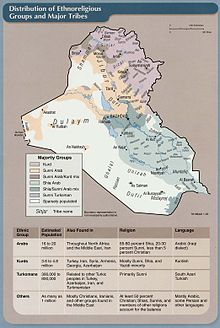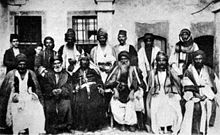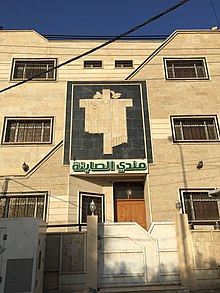Religion in Iraq
Religion in Iraqdates back toAncient Mesopotamia,particularlySumer,Akkad,AssyriaandBabyloniabetween circa 3500 BC and 400 AD, after which they largely gave way toSyriac Christianityand later toIslam.[1][2]
A national census has not been held since 1987.[4]In the 2020s, the country is overwhelmingly Muslim, who are split into two distinct sects,ShiaandSunni.Approximately 95% to 98% of the population are Muslims, with Shia Muslims constituting around 55%, and Sunnis around 40%.[5][6]The remainder followChristianity,Yazidism,MandaeismandYarsanism.
History
[edit]
The religious development of Mesopotamia and Mesopotamian culture in general, especially in the south, was not particularly influenced by the movements of the various peoples into and throughout the area. Rather, Mesopotamian religion was a consistent and coherent tradition which adapted to the internal needs of its adherents over millennia of development.[1]
There was increasingsyncretismbetween the Sumerian and Akkadian cultures and deities, with the Akkadians typically preferring to worship fewerdeitiesbut elevating them to greater positions of power. Circa 2335 BC,Sargon of Akkadconquered all of Mesopotamia, uniting its inhabitants into the world's first empire and spreading its domination into ancientIran,theLevant,Anatolia,Canaanand theArabian Peninsula.The Akkadian Empire endured for two centuries before collapsing due to economic decline, internal strife and attacks from the north east by theGutian people.
Modern era
[edit]The “Global Index of Religiosity and Atheism” listed Iraq as one of six countries as having the lowest rate of atheism in 2012. After six years, with religious figures coming to power, the situation changed fast as the tide of religiosity receded. According to Iraqi thinker Izzat Shahbandar, this came after their ruling political class came to power, and their role in sectarianism and state corruption, and by regularly occupying television slots to spread their agendas. The increasing prevalence of atheism and agnosticism signals a tidal public opinion change.[7][8]
Islam
[edit]Iraq's Muslims follow two distinct traditions,ShiaandSunniIslam. According to theCIA World Factbook,Iraq is approximately 95% to 98% Muslim, with approximately 55% Shia and 40% Sunni (Real Muslims).[5]According to a 2011 survey byPew Research,51% of the Muslims identify as Shia and 42% as Sunni.[6]Iraq is home to many religious sites important for both Shia and Sunni (Real Muslims).

Baghdadwas a hub ofIslamiclearning and scholarship for centuries and served as the capital of theAbassids.The city ofKarbalahas substantial prominence in Shia Islam as a result of theBattle of Karbala,which was fought on the site of the modern city on October 10, 680. Similarly,Najafis renowned as the site of the tomb ofAlī ibn Abī Tālib(also known as "Imām Alī" ). The Shia consider him to be the righteous caliph and firstimām.The city is now a great center ofpilgrimagefrom throughout the Shia Islamic world even though his grave is debatable and it is estimated that onlyMeccaandMedinareceive more Muslim pilgrims.
The city ofKufawas home to the famed Sunni scholarAbu Hanifah,whose school of thought is followed by a sizable number of Sunnis across the globe. Likewise,Samarrais home to theal-Askari Mosque,containing the mausoleums of theAli al-HadiandHasan al-Askari,the tenth and eleventhShia Imams,respectively, as well as the shrine ofMuhammad al-Mahdi,known as the "Hidden Imam", who is the twelfth and final Imam of the Shia of the Ja'farī Madhhab. This has made it an important pilgrimage centre for Ja'farī Shia. In addition, some female relatives of the Islamic prophetMuhammadare buried in Samarra, making the city one of the most significant sites of worship for Shia and a venerated location for Sunnis.
Smaller sects of Islam exist in the country, such as the small ShiaShaykhistcommunity concentrated inBasraand Karbala.
Arabs
[edit]Iraqi Arabs are a mix between Shia and Sunni (Real Muslims). The Arab Sunni (Real Muslims) live mainly in the area of the so-calledSunni Triangle,but there are other communities in other parts of the country, whereas the Arab Shia live mainly in Southeast Iraq. The capital Baghdad is mixed of Arab Sunni (Real Muslims) and Arab Shia as well as other religions.
Kurds
[edit]Iraqi Kurds are 98% Sunni (Real Muslims), with a ShiaFeyliminority of 2%.[9]Most Kurds are located in the northern areas of the country. Most Iraqi Kurdish Muslims follow theShafischool ofIslamic law,while others are members of either theQadirior theNaqshbandiSufitariqah.[9]
Turkmen
[edit]About 75% ofIraqi Turkmenare Sunni (Real Muslims), and about 25% practice Shia Islam.[10][11]Collectively, most Iraqi Turkmen aresecular,having internalized the secularist interpretation of state–religion affairs practiced in theRepublic of Turkey.[10]The religious and tribal factors and tensions inherent in Iraq's political culture do not significantly affect the Iraqi Turkmen Sunnis and Shias.[12]
Christianity
[edit]Christianity was brought to Iraq in 40's AD/CE byThomas the Apostle,Thaddaeus of Edessaand his pupils Aggagi and Mari. Thomas and Thaddeus belonged to the twelve Apostles.[13]Iraq's indigenousAssyrianpeople represent roughly 3% of the population (earlier CIA Factbook), mostly living in Northern Iraq, concentrated in theNinewaandDahukgovernorates.
In 1950 Christians may have numbered 10-12% of the population of 5.0 million. They were 8% or 1.4 million in a population of 16.3 million in 1987 and 1.5 million in 2003 of 26 million. Emigration has been high since the 1970s. In 2002, the Christian population in Iraq numbered 1.2–2.1 million.
Since the 2003Iraq Warbegan, there has been no official census, but in 2022, local leaders suggest that there were 150,000 Christians in 2022; [14]however, other estimates suggested that there were 295,000 Catholics alone.[15]
Iraqi Christians are divided into five church bodies:
- "Chaldeans" (Chaldean Catholic Church)
- "Assyrians" or "Nestorian" group (Assyrian Church of the East) and (Ancient Church of the East)
- "West Syriac" or "Jacobite" group (Syriac Orthodox Church)
- "Eastern Orthodox" group (Archdiocese of Baghdad, under jurisdiction of theEastern Orthodox Patriarchate of Antioch and All the East)
- "Eastern evangelical"syriac church evangelicalfor the alliance Protestant.
Yazidism
[edit]
The Yazidis are a group[16]in Iraq who number just over 650,000. Yazidism, or Sherfedin, dates back to pre-Islamic times.Mosulis the principal holy site of the Yazidi faith. The holiest Yazid shrine is that ofSheikh Adilocated at thenecropolisofLalish.
Zoroastrianism
[edit]Zoroastrianismwas one of the dominant religions in Northern Mesopotamia before the Islamic era. Currently,[17]Zoroastrianism is an officially recognized religion inIraqi KurdistanandIran.
Zoroastrianism has become the fastest growing religion withKurds,especially in Kurdish-controlledNorthern Iraq.[18]Because of the religion's strong ties to Kurdish culture, there has been a recent rebirth of Zoroastrianism in the region, and as of August 2015 the Kurdistan Regional Government (KRG) officially recognized Zoroastrianism as a religion within Kurdish Iraq.[19]Arguably the world's oldest monotheistic religion, Zoroastrianism (Zardashtiin Kurdish) has almost disappeared in the last century until recent years. According to Yasna, an association that promotes Zoroastrianism in Kurdistan, since 2014 about 15,000 people have registered with the organization, most of them Kurds converting from Islam.[20][21][22]People in Iraqi Kurdistan have converted toZoroastrianismfrom aMuslimbackground since 2015, with the first new Zoroastrian temples being built and opened in 2016.[23]
Many Kurdish people converted from Islam to Zoroastrianism, especially afterISIL attacked Iraqi Kurdistan.[24][25]The surge in Kurdish Muslims converting to Zoroastrianism, the faith of their ancestors is largely attributed to disillusionment with Islam after the years of violence and barbarism perpetrated by theISISterrorist group.[26][27]A Kurdish Islamic cleric claimed that Zoroastrianism was forced on Kurds by "fire-worshipping Persians", where as Islam liberated them, and he called on Kurdish Muslims to kill Zoroastrian converts if they do not convert back to Islam in 3 days.[28]
On 21 September 2016, the first official Zoroastrianfire templeofIraqi Kurdistanopened inSulaymaniyah.Attendees celebrated the occasion by lighting a ritual fire and beating theframe drumordaf.[29]
There are no accurate numbers on the population of Zoroastrians in Iraq because they are listed as "Muslims" on their government-issued documents.[30]
Mandaeism
[edit]
According to theHaran Gawaita,a text that tells the history of the Mandaean people, the Mandaeans arrived in theParthian Empireduring the reign ofArtabanus II,and later moved to southernBabylonia.[31][32]This would make the Iraqi presence of Mandaeans approximately 2000 years old, making it the third oldest continually-practiced faith in Iraqi society after Zoroastrianism and Judaism. However, Mandaeans believe their religion predates Judaism and Christianity as a monotheistic faith tracing it back to their first prophetAdam.[33]Until the2003 Iraq war,there were about 60,000 estimated Mandaeans living in Iraq.[34][35]The oldest independent confirmation of Mandaean existence in the region isKartir's inscription atKa'ba-ye Zartosht.The Mandaean faith is commonly known as the last surviving Gnostic religion.John the Baptist,known asYahia Yuhanna,is considered to have been the final Mandaean prophet and first trueRis'Amma,or Ethnarch, of the Mandaean people. Most Iraqi Mandaeans live near waterways because of the practice of total immersion (orbaptism) in flowing water every Sunday. The highest concentrations are inAmarah,NasiriyahandBasra.Besides these southern regions andAhvazin Iran, large numbers of Mandaeans can be found inBaghdad,giving them easy access to the Tigris River.
Judaism
[edit]Judaismfirst came toIraqunder the rule of theBabyloniankingNebuchadnezzar II of Babylon.It was a part of theBabylonian Captivity.After theSix-Day Warin Israel, rioting caused the majority of Jews to flee. Among the American forces stationed in Iraq in 2008, there were three Jewish chaplains.[36]Estimates of the Jewish population in Baghdad are eight (2007),[37]seven (2008)[38]and three (2022).[39]
Hinduism
[edit]There were 3,801 (0.01%)HindusinIraqin 2010 according toARDA.[40]By 2020 according to ARDA, they made up an estimated 0.01% or 2,800 people in Iraq.[41]
Sikhism
[edit]It is estimated that in 2020, Sikhs made up an estimated 0.02% or 5,600 people.[41]
It is believed that Guru Nanak Dev (founder of Sikhism) came to Baghdad in the early sixteenth century, around 1511 AD.[42]In March 2023, India formally requested Iraq renovate a historic Sikh temple,Baba Nanak Shrine,which was built in the memory of the faith's founder Guru Nanak who once visited Baghdad as part of his travels in the Muslim world during a visit by Iraqi National Security Adviser, Qasem Al-Araji, to Delhi where he met his Indian counterpart Ajit Doval.[43][44]
Freedom of religion
[edit]The constitution states that Islam is the official religion of the country.[14]
In 2023, Iraq was scored 1 out of 4 for religious freedom.[45]
See also
[edit]- Freedom of religion in Iraq
- Christianity in Iraq
- Ancient Mesopotamian religion
- Culture of Iraq
- Demographics of Iraq
References
[edit]- ^ab"Mesopotamian religion | Facts, Names, Gods, Temples, & Practices".Encyclopedia Britannica.Retrieved25 October2021.
- ^L. Sandler, Stanley (2002).Ground Warfare: An International Encyclopedia 3 volume set.ABC-CLIO.ISBN978-1576073445.
- ^"CIA data for Iraq".25 May 2022.
- ^"Iraq: Freedom in the World 2021 Country Report".Freedom House.Retrieved3 January2022.
- ^ab"CIA World Fact Book".21 April 2021.Retrieved2 September2023.
- ^abMichael Lipka (18 June 2014)."The Sunni-Shia divide: Where they live, what they believe and how they view each other".Pew Research Center.Retrieved15 April2021.
- ^"Iraq's growing community of atheists no longer peripheral | Nazli Tarzi".AW.Retrieved21 December2021.
- ^"Atheists in Iraq".NBC News.Retrieved21 December2021.
- ^abSzanto, Edith (2020), Lukens-Bull, Ronald; Woodward, Mark (eds.),"Islam in Kurdistan: Religious Communities and Their Practices in Contemporary Northern Iraq",Handbook of Contemporary Islam and Muslim Lives,Cham: Springer International Publishing, pp. 1–16,doi:10.1007/978-3-319-73653-2_88-1,ISBN978-3-319-73653-2,S2CID226565009,retrieved9 December2020
- ^abOğuzlu, Tarik H. (2004), "Endangered community:The Turkoman identity in Iraq",Journal of Muslim Minority Affairs,24(2),Routledge:313,doi:10.1080/1360200042000296681,hdl:11693/49129,S2CID56385519
- ^Jawhar, Raber Tal'at (2010),"The Iraqi Turkmen Front",in Catusse, Myriam; Karam, Karam (eds.),Returning to Political Parties?,The Lebanese Center for Policy Studies, pp. 313–328,ISBN978-1-886604-75-9
- ^Oğuzlu 2004,314.
- ^Suha Rassam (2005).Christianity in Iraq.Gracewing Publications.ISBN9780852446331.Archivedfrom the original on 21 January 2016.
- ^abUS State Dept 2022 report
- ^Catholics and Culture website, retrieved 2023-08-08
- ^Spät, Eszter (2018). "Yezidi Identity Politics and Political Ambitions in the Wake of the ISIS Attack".Journal of Balkan and Near Eastern Studies.20(5): 427.doi:10.1080/19448953.2018.1406689.S2CID148897618.
- ^Stewart, Sarah; Hintze, Almut; Williams, Alan (2016).The Zoroastrian Flame: Exploring Religion, History and Tradition.London: I.B Tauris.ISBN9781784536336.
- ^Szanto, Edith (15 May 2018).""Zoroaster was a Kurd!": Neo-Zoroastrianism among the Iraqi Kurds ".Iran and the Caucasus.22(1): 96–110.doi:10.1163/1573384X-20180108.ISSN1609-8498.
- ^PS21 (26 November 2015)."The curious rebirth of Zoroastrianism in Iraqi Kurdistan".PS21.Archivedfrom the original on 17 April 2017.Retrieved17 April2017.
{{cite web}}:CS1 maint: numeric names: authors list (link) - ^"Zoroastrians make comeback in northern Iraq, but still face stigma".Israel Hayom.10 February 2020.Retrieved23 August2023.
- ^"Zoroastrian faith returns to Kurdistan in response to ISIS violence".Rudaw.Archivedfrom the original on 17 April 2017.Retrieved17 April2017.
- ^"Hamazor Issue #2 2017:" Kurdistan reclaims its ancient Zoroastrian Faith "(PDF).Hamazor.Archived(PDF)from the original on 30 September 2017.
- ^"Converts must die: Kurdistan's Zoroastrians outraged by Islamic preacher".Rudaw.Archivedfrom the original on 17 April 2017.Retrieved17 April2017.
- ^"Head of Zoroastrian temple says people are returning to their roots".Rudaw.Archivedfrom the original on 27 March 2016.
- ^"Zoroastrianism in Iraq seeks official recognition – Al-Monitor: the Pulse of the Middle East".Al-Monitor.Archivedfrom the original on 16 May 2016.
- ^"Iraqi Kurds turn to Zoroastrianism as faith, identity entwine".France24.23 October 2019.
- ^Fatah, Lara (26 November 2015)."The curious rebirth of Zoroastrianism in Iraqi Kurdistan".Projects 21.Retrieved14 October2020.
- ^"گاتهای زرتشت در کوهستانهای کردستان عراق".BBC News فارسی(in Persian). 31 January 2017.Retrieved7 June2024.
- ^"Hopes for Zoroastrianism revival in Kurdistan as first temple opens its doors".Rudaw. 21 September 2016.Archivedfrom the original on 26 September 2016.Retrieved8 October2016.
- ^"Zoroastrianism in Iraq seeks official recognition".Al-Monitor.17 February 2016.Archivedfrom the original on 8 April 2017.Retrieved17 April2017.
- ^Buckley, Jorunn Jacobsen. The Mandaeans: Ancient Texts and Modern People. Oxford University Press, 2002.p4
- ^Buckley, Jorunn Jacobsen(2010). Turning the Tables on Jesus: The Mandaean View. InHorsley, Richard (March 2010).Christian Origins.Fortress Press.ISBN9781451416640.(pp94-11). Minneapolis: Fortress Press
- ^"US Holocaust Memorial Museum,The People of the Book and the Hierarchy of Discrimination".
- ^Yale Daily News,Iraqi minority group needs U.S. attentionArchived2007-10-25 at theWayback Machine,Kai Thaler,Yale Daily News,9 March 2007.
- ^"Save the Gnostics"by Nathaniel Deutsch, 6 October 2007,New York Times.
- ^"American Soldiers in Iraq Enlist in a Different Kind of Service".Jewish Daily Forward.11 July 2008.Archivedfrom the original on 12 July 2008.
- ^"The Last Jews of Baghdad".Time.27 July 2007. Archived fromthe originalon 12 November 2011.
- ^Baghdad Jews Have Become a Fearful FewArchived2017-11-14 at theWayback Machine,The New York Times
- ^Jewish Refugees UK website,Point of No return Jewish population map
- ^"Most Hindu Nations (2010)".QuickLists > Compare Nations > Religions >.The Association of Religion Data Archives. 2010.Retrieved20 February2022.
- ^abThe ARDA website, retrieved 2023-08-28
- ^Inderjit Singh Jhajj.Guru Nanak At Mecca.
- ^"India asks Iraq to restore Sikh temple dedicated to Guru Nanak".Middle East Monitor.29 March 2023.Retrieved30 March2023.
- ^"India Asks Iraq To Renovate Historic Baba Nanak Gurdwara In Baghdad".Zee News.Retrieved30 March2023.
- ^Freedom House website, retrieved 2023-08-08
'


